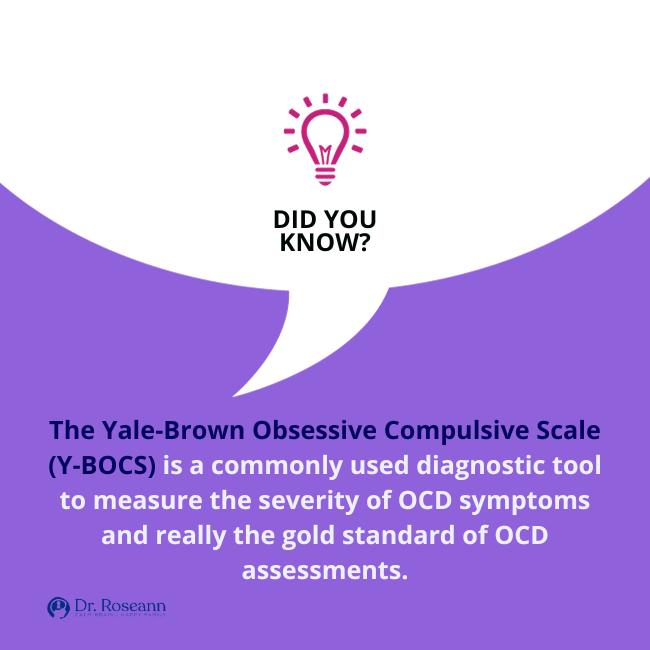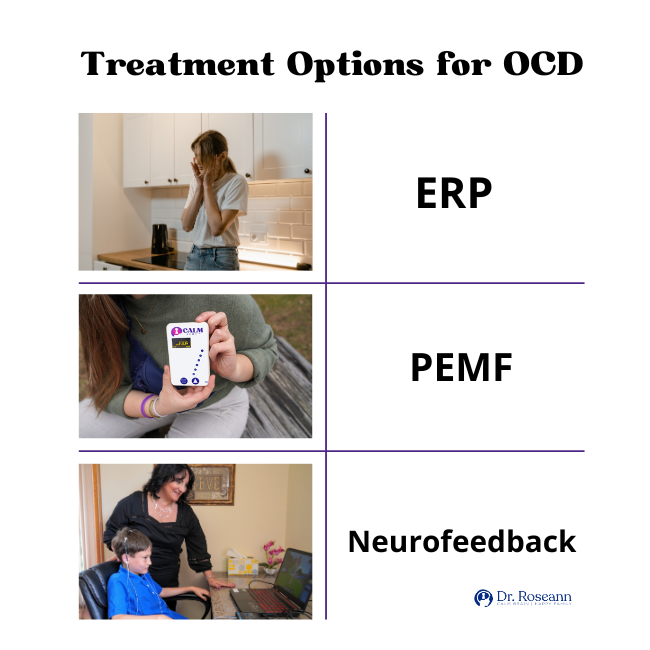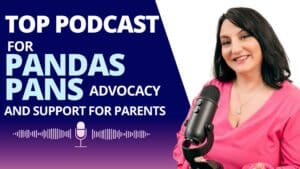Obsessive Compulsive Disorder (OCD) is a complex mental health condition that affects millions of people worldwide. To provide effective treatment for OCD, it is crucial to begin with a thorough and accurate diagnosis. But how do you test for OCD?
Parents should know the various tests and assessment methods for OCD. Learning it from professional help will lead them to understand the diagnostic criteria for OCD as outlined in the Diagnostic and Statistical Manual of Mental Disorders (DSM-5). A qualified clinician tests obsessive compulsive disorder using this standard.
OCD manifests through intrusive thoughts and compulsive behaviors that significantly impact daily life. Various types of OCD exist, each presenting unique challenges for individuals. Unwanted thoughts and the cycle of obsessions can be distressing, which prompts the need for proper assessment and diagnosis. This is why OCD screening is important.
At the core of OCD diagnosis lies the DSM-5, a manual that sets forth specific criteria for mental health conditions. Mental health professionals use this manual to guide their assessments and ensure accurate diagnoses to come up with appropriate treatment plans tailored to each individual.
Assessment and Test for OCD
There is no single definitive test for OCD, but a diagnosis is typically based on a thorough assessment by a mental health professional. Here are some common methods and tools used in the assessment of OCD:
Clinical Interviews
Mental health professionals, such as psychiatrists or psychologists, often conduct detailed interviews to gather information about the individual's obsessive feelings, thoughts and behaviors. They may ask about the nature of obsessions and compulsions, their impact on daily life, and the level of distress they cause.
Diagnostic Criteria
The diagnosis of OCD is usually made using standardized criteria outlined in the Diagnostic and Statistical Manual of Mental Disorders (DSM-5), published by the American Psychiatric Association. The DSM-5 provides specific criteria that must be met for a diagnosis of OCD.
Self-Report Measures
Individuals may be asked to complete self-report questionnaires or surveys that assess the presence and severity of OCD symptoms. The Yale-Brown Obsessive Compulsive Scale (Y-BOCS) is a commonly used diagnostic tool to measure the severity of OCD symptoms and really the gold standard of OCD assessments.

In our program, our expert OCD therapists fill out the Y-BOCS with the client because it is a great way to really understand how obsessions, compulsions and rituals impact one’s life.
Observation
Mental health professionals may observe the individual's behavior to identify specific rituals or compulsive actions. This can provide valuable information about the nature and impact of the compulsions.
Functional Assessment
Understanding how OCD symptoms impact the individual's daily functioning is essential. Questions may be asked about how much time is spent on obsessions and compulsions, the level of interference with daily activities, and the distress caused.
Medical Evaluation
A thorough medical evaluation is important to rule out any physical conditions that may contribute to or mimic OCD symptoms. Sometimes, certain medical conditions or medications can cause symptoms similar to those of OCD.
Ruling out physical conditions through a blood test and physical exam is a crucial step. Collaboration with healthcare providers ensures a holistic approach to understanding and addressing the various factors influencing OCD symptoms.
Treatment Options for OCD

Once a comprehensive assessment has been conducted and an accurate diagnosis of OCD has been established, the next crucial step is exploring various treatment options. It's important to note that the effectiveness of treatment can vary among individuals, and a personalized approach is often necessary.
Here, we delve into the diverse array of therapeutic avenues available, ranging from established methods to cutting-edge interventions.
Cognitive-behavioral therapy (CBT)
One of the cornerstones in treating OCD is Cognitive-Behavioral Therapy, specifically Exposure and Response Prevention (ERP). CBT targets the underlying thought patterns and behaviors associated with OCD.
In ERP, people with OCD are gradually exposed to the thoughts, images, and situations that trigger an anxiety disorder while learning healthier ways to cope without resorting to compulsive behaviors. This evidence-based approach is widely recognized for its effectiveness in helping people regain control over their lives.
Transcranial Magnetic Stimulation (TMS) and PEMF Therapy
In recent years, innovative treatments such as Transcranial Magnetic Stimulation (TMS) have shown promise in addressing treatment-resistant OCD (Tal Harmelech et al., 2023). TMS involves the use of magnetic fields to stimulate specific regions of the brain, particularly the frontal cortex associated with OCD. TMS represents a hopeful avenue for those who may not respond to traditional therapies.
PEMF therapy involves the application of electromagnetic fields to the body, and it has been studied for various medical conditions, including some mental health disorders. The theoretical basis for its use in mental health is related to its impact on brain activity and neurotransmitter regulation.
Neurofeedback and The OCD Brain
When Mickey came to us with OCD, he had already tried ERP therapy three times but was too activated to make it through. It wasn’t until he began neurofeedback to calm and regulate his brain that he was able to tolerate exposures and completely overcome his OCD.
Neurofeedback is a well researched, safe and effective way to calm the nervous system and retrain anxious brain waves.
OCD Screening and Treatment Plans
An effective treatment plan often involves a combination of therapeutic modalities tailored to the individual's needs. This may include regular sessions of individual or group therapy, medication management, and incorporating strategies learned in therapy into daily life. A holistic approach ensures that various aspects of the individual's experience with OCD are addressed.
OCD doesn't just affect the individual; it has an impact on the entire family. Including family members in the treatment process can foster a supportive environment. Psychoeducation and family therapy help loved ones understand OCD better, enabling them to provide the necessary support and encouragement during the recovery journey.
Recovery from OCD is an ongoing process that requires one to have the skills to talk back to their OCD. Regular assessment by mental health professionals ensures that the treatment plan remains effective. Adjustments can be made based on the individual's progress, and new strategies can be introduced to address emerging challenges.
Beyond individual treatment, it is crucial to continue breaking the stigma surrounding mental health disorders. The American Psychiatric Association and other mental health organizations play a vital role in fostering awareness, promoting understanding, and advocating for improved mental health services.
Living with OCD: Navigating Daily Challenges
Coping mechanisms, seeking reassurance, and building a support system for family members are integral components of managing OCD. Understanding the common symptoms of OCD and providing a safe space for open communication are vital aspects of fostering a supportive environment.
The journey to recovery involves ongoing assessment, adjustments to treatment plans, and breaking the stigma surrounding this mental health disorder. Parents who seek reassurance should consult with a professional for advice as early intervention contributes to a more positive outcome.
Accurate diagnosis is the cornerstone of effective OCD treatment. By understanding the various assessment methods and seeking professional help, individuals can embark on a journey toward improved mental health and a better quality of life. Remember, reaching out for help is the first step towards recovery.
Parent Action Steps
☐ Learn more about OCD by listening to my It’s Gonna Be OK! Podcast and the OCD series.
☐ Be attentive to your child's behavior, noting any signs of significant distress or repetitive behaviors.
☐ Collaborate with a healthcare provider to do an OCD test and explore therapies like CBT and ERP.
☐ Be a source of emotional support for your child with compulsive symptoms or related disorders.
☐ Understanding your child’s challenges without enabling compulsive behaviors.
☐ Take the OCD Quiz to find the right solutions for your child.
☐ Use the Solutions Matcher to get personalized treatments for OCD.
Citations
Shupak, N. M., Prato, F. S., & Thomas, A. W. (2003, December). Therapeutic uses of pulsed magnetic-field exposure: A review | URSI Journals & Magazine | IEEE Xplore. Ieeexplore.ieee.org. https://ieeexplore.ieee.org/abstract/document/7909506
Tal Harmelech, Roth, Y., & Tendler, A. (2023). Transcranial Magnetic Stimulation in Obsessive-Compulsive Disorder. Psychiatric Clinics of North America, 46(1), 133–166. https://doi.org/10.1016/j.psc.2022.10.003
Dr. Roseann is a mental health expert who frequently is in the media:
- Insider: What is OCD?
- What to Expect: Why Does My Toddler Keep Pulling Her Own Hair?
- Parade: Why Does My Toddler Keep Pulling Her Own Hair?
- Single Care Controlling the uncontrollable: Living with OCD during a pandemic
- MomsCove How to Help a Child with Anxiety and OCD
- Holistic Counseling Podcast: Effective Treatments for OCD
- Epidemic Answers: Neurofeedback for ADHD, anxiety, OCD and mood
- Cai Grahm: Is it anxiety or OCD?
- BCIA: Calming the OCD Brain with Neurofeedback and ERP Therapy
- Hope for Anxiety and OCD: Sudden Onset OCD
- Integrative Practitioner: Integrative Approaches to Treating OCD
HappiHuman: Is it an Eating Disorder or OCD
Are you looking for SOLUTIONS for your struggling child or teen?
Dr. Roseann and her team are all about science-backed solutions, so you are in the right place!
Dr. Roseann is a Children’s Mental Health Expert and Licensed Therapist who has been featured in/on hundreds of media outlets including The Mel Robbins Show, CBS, NBC, PIX11 NYC, Today, FORBES, CNN, The New York Times, The Washington Post, Business Insider, Women’s Day, Healthline, CNET, Parade Magazine and PARENTS. FORBES called her, “A thought leader in children’s mental health.”

She coined the terms, “Re-entry panic syndrome” and “eco-anxiety” and is a frequent contributor to media on mental health.
Dr. Roseann Capanna-Hodge has three decades of experience in working with children, teens and their families with attention-deficit hyperactivity disorder (ADHD), autism, concussion, dyslexia and learning disability, anxiety, Obsessive Compulsive Disorder (OCD), depression and mood disorder, Lyme Disease, and PANS/PANDAS using science-backed natural mental health solutions such as supplements, magnesium, nutrition, QEEG Brain maps, neurofeedback, PEMF, psychotherapy and other non-medication approaches.
She is the author of three bestselling books, It’s Gonna Be OK!: Proven Ways to Improve Your Child's Mental Health, The Teletherapy Toolkit, and Brain Under Attack. Dr. Roseann is known for offering a message of hope through science-endorsed methods that promote a calm brain.
Her trademarked BrainBehaviorResetⓇ Program and It’s Gonna be OK!Ⓡ Podcast has been a cornerstone for thousands of parents facing mental health, behavioral or neurodevelopmental challenges.
She is the founder and director of The Global Institute of Children’s Mental Health, Neurotastic™Brain Formulas and Dr. Roseann Capanna-Hodge, LLC. Dr. Roseann is a Board Certified Neurofeedback (BCN) Practitioner, a Board Member of the Northeast Region Biofeedback Society (NRBS), Certified Integrative Mental Health Professional (CIMHP) and an Amen Clinic Certified Brain Health Coach. She is also a member of The International Lyme Disease and Associated Disease Society (ILADS), The American Psychological Association (APA), Anxiety and Depression Association of America (ADAA) National Association of School Psychologists (NASP), International OCD Foundation (IOCDF).
© Roseann-Capanna-Hodge, LLC 2023










